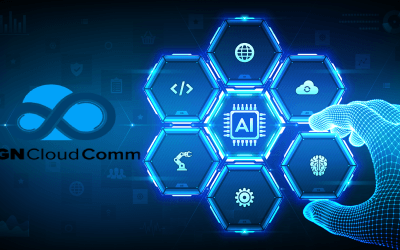Customer service is a top priority for many companies, and for good reason. It’s no secret that customer service is an important factor to consumers when they are determining whether or not to be loyal to a brand. Poor customer service leads to lost revenue and poor reputation.
Brands are further challenged to deliver on high customer service expectations as new digital communications channels enter the mix. For many reasons — busy lifestyles, owning diverse devices and more — consumers desire multiple touchpoints with brands, and they reward organizations that deliver across channels. However, there’s a major difference between multichannel and omnichannel, and customers have taken notice. Multichannel means having different communication channels through which a person can contact your company. Many customer service programs are currently capable of delivering multichannel solutions. But omnichannel means there’s a strategy behind each digital touchpoint and all are connected for a more holistic experience — a reality many organizations are still trying to implement.
Cloud-based omnichannel contact centers allow companies to add new communication channels to their digital customer service program, easily integrating new channels with existing ones. Connecting incongruent communications channels like email, text and social media creates a unified customer service experience that boosts metrics like satisfaction and brand loyalty.
Omnichannel contact centers use context to improve future customer experiences
Too often, customers experience frustration when interacting with brands and retailers because of disjointed communications. For example, a shopper who contacts a customer service representative via Twitter to report a missing package may have to repeat her personal information and problem when, later on, she transfers her resolution process to email.
Omnichannel contact centers provide a solution for this unnecessary disconnect. The technology can handle communications virtually anywhere customers choose to interact with organizations and ensures all touchpoints build on each other.
With an omnichannel contact center in place, the agent managing the above shopper’s customer service interaction is prepared with an entire timeline of her prior communications with the company. As the customer moves between channels or customer service representatives, a ‘customer ID’ or ‘customer profile’ travels with her so that she never has to re-explain her problem or previous resolution attempts. Rather than sort customers into broad buckets and assume certain demographics will prefer a specific type of talk track, omnichannel contact centers provide the context customer service teams require to tailor experiences on a 1-1 basis. This strategy boosts satisfaction and expedites the resolution process.
Omnichannel contact centers use data to take context one step further. Sentiment analysis should be a major part of the customer service experience, where organizations use data to better understand the interactions they’re having with customers via digital channels. For example, omnichannel contact centers can track pre-determined keywords across digital channels to denote an unhappy or happy customer in real time. This practice helps organizations learn what percentage of a customer’s communications with the brand have been positive or negative. Such a segmented understanding of the entire customer journey offers service agents additional context to improve future engagements.
As an added bonus, omnichannel contact centers can use data in aggregate to upgrade customer service programs beyond 1-1 interactions. Recognizing trends across and by channel empowers organizations to gain a more holistic understanding of their communications strategies and act on data-driven insights that boost program performance for all customers.
The entire operation benefits when customer service is a responsibility of the entire organization, instead of just the service level. Employees, no matter the departments they work in, must be as informed as possible on every individual customer, down to where else she has interacted with the company in the past. When a shopper shifts from customer service to another business department, it’s crucial that her personal information and entire history of engagements with the brand move with her, just as they do across customer service channels.
If the shopper with her missing package ultimately decides she’d like a reimbursement for her purchase, a transfer to the billing department should never necessitate her repeating her situation. To make the return process even easier, the employee who greets her at billing should already have access to her purchase history and credit card information from sales. Truly integrated omnichannel contact center solutions ensure that the customer experience does not suffer when engagements move beyond the walls of the customer service department. The technology empowers different departments to collaborate seamlessly and share important customer information and context.
Although decision makers feel the pressure to enhance their digital customer service programs fast, an important process conversation must take place as organizations bring on different customer experience technologies. Before investing, think through your entire customer journey and explore the full lifecycle of who a customer might talk to, when they might engage, the transfers that could happen across departments, etc.
If you are not sure where to start the process, contact the experienced team at Grupo NGN. We can help you determine what solutions work best for you and your customers.



